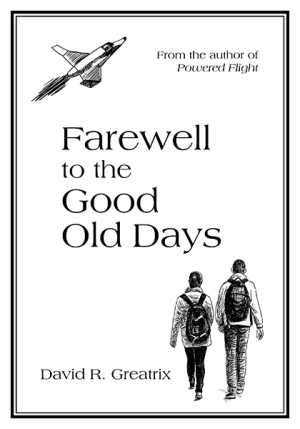
Farewell to The Good Old Days
This memoir about academia, career frustrations, and changing times includes insights and humor.
David R. Greatrix’s fictionalized memoir Farewell to the Good Old Days is about his life in academia.
The story follows Greatrix’s life, with some alterations, from his early childhood in a military family to his career as an engineering professor. From the very first page, it connects the dots between early events and David’s sense of identity in his adulthood. For example, as a toddler he is kicked in the head by a child on a swing, injuring his nose in a way that remains visible decades later. This injury becomes a visceral, physical example of the kinds of marks left by the events of his life.
Deep nostalgia carries throughout the book, particularly in scenes focused on David’s early years, but the narrative journeys back to moments of action well, avoiding the biases of time. The details of David’s university career are a behind-the-scenes look at academia, showcasing both the intrigue and the boredom of departmental life with insight and occasional humor. But stories about David’s academic career are tinged with difficult-to-read bitterness that springs from his feeling overlooked, missing out on due recognition for his commitment and hard work.
David’s interactions with, and observations about, colleagues from other cultures are compelling, revealing the politics and distrust that are sometimes rampant in academia. These recollections are inherently one-sided, and they contain biases that come with being a part of the dominant culture. Other characters recognize the limitations of David’s perspective with comments like, “This is how business is done in the Third World. You wouldn’t understand.”
The book works its way toward David’s retiring from his position as a self-described “lowly” associate professor. He leaves Canada, feeling unfulfilled and disconnected: “The Canada I knew … is gone. There’s nothing left for me here.” It is a fitting if uncomfortable ending.
The book moves at a slow pace, particularly when it’s covering David’s early years, which are full of details about family moves and school transitions that are not critical to the overarching story. Fictionalized elements—changed dates and places, and the combination of multiple people’s experiences—offer an opportunity for more narrative cohesion than might be possible in a strict recounting, though the book still ultimately becomes a play-by-play of academic infighting that clings to the guise of colleague anonymity. Included letters and emails impede the story, too.
Farewell to the Good Old Days is a personal narrative about resentment regarding career difficulties and changing times.
Reviewed by
Melissa Wuske
Disclosure: This article is not an endorsement, but a review. The publisher of this book provided free copies of the book and paid a small fee to have their book reviewed by a professional reviewer. Foreword Reviews and Clarion Reviews make no guarantee that the publisher will receive a positive review. Foreword Magazine, Inc. is disclosing this in accordance with the Federal Trade Commission’s 16 CFR, Part 255.
